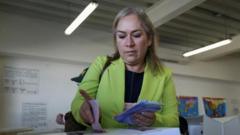Silvia Delgado's victory reflects significant societal and judicial transformations but raises concerns about organized crime influences in the judiciary.
**Controversial Election: Ex-El Chapo Lawyer Becomes Judge in Mexico**

**Controversial Election: Ex-El Chapo Lawyer Becomes Judge in Mexico**
Silvia Delgado, once a defense lawyer for notorious drug lord El Chapo, wins judgeship in Mexico's groundbreaking judicial elections.
A former defense attorney for Joaquín "El Chapo" Guzmán, a globally infamous drug lord, has been elected as a local criminal judge in Ciudad Juárez, marking a landmark moment in Mexico's judicial reforms. Silvia Delgado's candidacy has stirred controversy, as transparency watchdogs pointed to potential links between her and organized crime. Despite these allegations, Delgado has firmly denied any impropriety, maintaining that her role as El Chapo's defense attorney was merely a professional obligation to uphold legal representation.
Delgado, 51, was part of the team defending El Chapo before his 2017 extradition to the United States, where he was subsequently convicted on charges including drug trafficking, leading to a life sentence at a supermax facility in Colorado. In the lead-up to her election, she argued against claims of a conflict of interest, asserting that every defendant, regardless of their crimes, has a right to legal representation.
Her election, announced following voting results on Tuesday, marks Mexico's first-ever judicial elections held under a new reform initiative spearheaded by the ruling Morena party. Proponents of this election format argue that direct votes for judges, including Supreme Court justices, enhance democracy and accountability within the judicial system. Nonetheless, critics fear that such a system may threaten judicial independence and potentially pave the way for organized crime influences to infiltrate the courts.
Voter engagement appeared significantly low, with only 13% of eligible voters participating, the lowest turnout recorded in a federal election in Mexico. Observers interpreted this as an indication of public disinterest in the direct election of judges. In contrast, President Claudia Sheinbaum hailed the event as a major success for democracy, underscoring the government's commitment to reform.
As Silva Delgado awaits confirmation of her election, her ascent raises poignant questions about the intersection of legality, morality, and governance in a nation grappling with the legacies of drug-related violence and corruption. Her story encapsulates a broader narrative about the state of Mexico's justice system and the ongoing efforts to reclaim democratic processes.


















